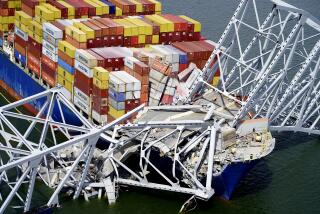‘Tragedy of Errors’ Blamed in Refugees’ Death : Captain Says He Didn’t Realize Plight on Boat
- Share via
Misled by a sailor aboard the U. S. warship Dubuque into believing that a rescue ship was on its way to their disabled junk, a boatload of Vietnamese refugees squandered most of their remaining food, then turned to cannibalism when the rescuers did not arrive, according to the Dubuque’s commanding officer.
The statements are in documents, obtained by The Times, that include Navy charges in a judicial action pending against the ship’s commander, Capt. Alexander G. Balian, and Balian’s account of the Dubuque’s meeting with the junk last June 9 in the South China Sea. They provide the most detailed description of the incident yet made public.
The encounter between the American amphibious transport dock and the disabled junk, fleeing Vietnam with an estimated 110 people on board, was described by Balian as a chaotic “tragedy of errors” plagued by poor interpreting and misunderstanding.
The captain said the American sailor, speaking in Vietnamese, told the panicky refugees not to worry because the Americans would not allow any others on the foundering junk to die. Arrangements were being made, the sailor shouted from a launch sent out from the Dubuque, for another ship to pick them up in two days.
But the sailor’s statement was merely a “wish” uttered to give hope to the refugees, according to Balian, who now faces a possible court-martial on a variety of charges, including 28 counts of negligent homicide. Neither Balian nor any other officer on the Dubuque knew of the sailor’s promise, Balian said in a lengthy statement.
“The food and water supplied the craft by Dubuque was squandered and lost in fighting over it, because the refugees felt that it needed to last only two days before they were to be picked up,” Balian said in the statement.
Later, the stronger refugees took control of the food and water and allowed the weak to perish or jump overboard to escape being murdered. Meanwhile, as many as 50 boats passed by the refugees after the Dubuque encounter and failed to help, contend Balian’s San Diego-based lawyers, Lt. Cmdr. Ronald Petronio and Dan Donato Jr., a former Navy captain who interviewed a dozen of the refugees in the Philippines.
All the refugees wept when they told of the many vessels passing by, some within yards, Donato said. At times the refugees poured gasoline on items of clothing and lit them to attract the attention of the ships, Donato said.
Among those eventually cannibalized were a 12-year-old boy and a 15-year-old boy who were murdered and a 12-year-old girl who died, according to sources familiar with the investigation. In all, five people were cannibalized, according to the sources.
Navy documents on the case do not include a full recounting of the incident and do not mention the statements attributed by Balian to the unidentified sailor nor the account of 50 other ships bypassing the refugees.
Navy hearings on charges against Balian ended earlier this month, and the Navy is now deciding whether he should be court-martialed. Charges considered at the hearings include allegations that Balian ordered his crew not to throw life preservers to three refugees who jumped off the junk, and that crew members were ordered to shake refugees off ropes as they tried to climb aboard the Dubuque. Balian denied those charges, and his lawyers say the allegations were disputed at the hearings.
The Navy also charged that the junk was “in an unseaworthy condition with an inoperative engine (and) an ineffective sail” and the refugees “were in imminent danger of being lost at sea.”
“Had I had even an inkling that foul play might have ensued, or had the true facts been known to me, I am certain I would have made the decision to embark these refugees, as I had done on two prior occasions while in command of other ships,” Balian said.
Because of the chaotic situation, poor interpreting and inaccurate reports relayed to the bridge of the Dubuque, Balian said, he thought the refugees were in relatively good shape and left them with a chart, instructions and enough food to complete the seven-day journey to Palawan in the Philippines.
Instead, the refugees attempted to stay in the area of the encounter with the Dubuque so that the promised rescue ship could locate them, Balian said. But no help came, and the refugees drifted 19 days before Philippine fishermen rescued them.
The 28 possible counts of negligent homicide involve the deaths of the refugees who perished after Balian declined to pick them up.
Only 52 of the about 110 people who set sail aboard the junk May 22 survived the 37-day trip, which began in Ben Tre in southern Vietnam. Some reportedly died before the encounter with the Dubuque, either of illness or drowning as they attempted to swim to passing ships.
Article 32 Hearings
Details of their gruesome journey have emerged from Article 32 hearings held by the Navy this month in Bahrain and the Philippines. Article 32 hearings are similar to grand jury investigations in civilian courts and are held to determine whether a full court-martial should be ordered. That decision, to be made by Rear Adm. Geoffery L. Chesbrough at the Subic Bay Naval Base in the Philippines, is expected within days. Chesbrough is commander of the Naval Surface Group for the Western Pacific.
The Times obtained documents in the case from Balian’s lawyers. Lt. Cmdr. Kevin Mukri, a Navy public affairs officer in the Philippines, said Thursday in a telephone interview that no decision has been reached in the case and that he could not comment on a pending investigation. Attempts to reach Navy officials conducting the investigation were unsuccessful.
Balian, who is in Japan awaiting the outcome of the legal proceedings, has denied all the charges, and said through his lawyers and in the lengthy written statement that he did everything he thought was necessary to help the refugees, based on the information available to him. The statement represents a summary of Balian’s account of the incident, as compiled by his attorneys.
As Balian recalls the events, the Dubuque, on a tight schedule since early March, was speeding toward the Arabian Gulf last June when, using binoculars, he observed the junk from the bridge and saw that a sail was up and it was making slight headway. His own crew, Balian said, “was under considerable stress (because of the tight schedule) and emotions were high.” The encounter was midway between Vietnam and Palawan, the Philippines, about 280 nautical miles from land.
As the Dubuque approached the junk to assess the situation, “refugees were seen jumping into the water and swimming toward the ship,” Balian said, adding that he personally took over the ship’s controls to make sure that the refugees were not injured by the Dubuque’s “screws, rudders and sea suctions.” A Vietnamese sailor in the crew was ordered to use the ship’s loudspeaker system to warn the swimmers away, he said.
A small group of sailors was then ordered into a motorboat so that they could pull up close to the junk to talk to its passengers and find out if any were sick or dying and determine whether the junk was seaworthy, he said.
‘Chaotic, Frantic’
Balian maintained radio contact with his executive officer, who was aboard the launch, circling the junk, where conditions were “chaotic” and “frantic,” Balian said.
“After repeated questioning, the refugees consistently indicated that no one on board was either sick or injured,” he said. They were, however, emaciated and hungry, so Balian provided the estimated 50 to 60 people with 400 pounds of food and 50 gallons of water.
According to Balian’s statement, it was apparently during the 90-minute encounter between the launch and the junk that the sailor made the promise about the rescue ship. Balian said he never authorized such a promise and did not learn about it until much later.
“I have since discovered that a tragedy of errors resulted in the junk’s inability to reach land as I had projected, and the felonious activity of killing and cannibalization of some of the refugees,” Balian said.
Balian said he was told that the refugees had left Vietnam seven days before he encountered them, when in fact they had said they had run out of food seven days earlier. In reality, they had been at sea for 18 days and had been drifting for 15 days because the junk’s engine had failed.
Balian also believed that the ship had no engine and had travelled half-way to the Philippines in seven days by sail. He then erroneously calculated that the junk could complete its journey in another seven days.
Also, because of erroneous reports, he was unaware that no one on board the junk knew how to sail and no one knew how to fish in the ocean, he said. Further, Balian and the Dubuque’s crew, who counted between 50 and 60 people on the deck of the junk, were unaware that there were sick and dying people out of sight below deck, he said.
Balian likened his situation to that of Capt. Will C. Rogers III, skipper of the Vincennes, the U. S. warship that mistakenly shot down an Iranian civilian airliner, killing all 290 people aboard. A Pentagon investigation exonerated Rogers, saying his crew had made mistakes and that Rogers had made his decision to fire at the plane based on the information he had available.
“Since the political climate that existed in the Vincennes matter does not, apparently, exist in my case, I fully expect to answer for my charges at general court-martial,” Balian said.
More to Read
Sign up for Essential California
The most important California stories and recommendations in your inbox every morning.
You may occasionally receive promotional content from the Los Angeles Times.










